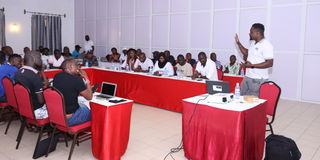Adak warns athletes on food supplements

An Anti-Doping Agency of Kenya (Adak) official addresses sports journalists during a seminar organised by Sports Journalists Association of Kenya (SJAK) in Diani, Kwale County on July 8, 2022.
What you need to know:
- Adak’s director of education, Agnes Mandu, advised local athletes to be careful with food supplements which may contain banned substances
- Although food supplements are not banned, the agency is yet to come up with a clear policy governing their use
- SJAK vice president James Magayi said journalists were now better equipped to cover stories on doping
The Anti-Doping Agency of Kenya (Adak) has urged Kenyan sportsmen and women to pay particular attention to what they consume, saying athletes are ultimately responsible for actions that influence the direction of their careers.
At the same time, the agency has called for collaboration in the fight against the doping menace.
Speaking Saturday during a two-day seminar organised in conjunction with Sports Journalists Association of Kenya (SJAK) in Diani, Kwale County, Adak’s director of education, Agnes Mandu, advised local athletes to be careful with food supplements which may contain banned substances.
“There is no policy in Kenya governing use of food supplements in sport, and we are still way behind in making sure that what the athletes may be consuming is the right thing. That is why we discourage use of food supplements, although athletes from other countries may be using the substances,” said Mandu.
She said although food supplements are not on the prohibited list, they are manufactured locally and might contain banned substances which might put athletes in trouble.
Although food supplements are not banned, the agency is yet to come up with a clear policy governing their use.
“When an athlete eats a well-balanced diet, they are able to perform well. A balanced diet supplies everything, including strength that they need to perform. They should not depend on food supplements in order to perform well. In any case, we are yet to develop a clear policy governing their use,” she said.
She pointed out that Adak has started a programme in conjunction with Kenya Institute of Curriculum Development that targets children in school with the goal of helping deal with the menace in the long run.
“The programme is on mainstreaming values of life, and targets young school going kids. We don’t teach them about doping, rather it inculcates the spirit of sportsmanship and good values in them. Soon, schools will be teaching the spirit of good values during school games. When they come of age, the children will take up the mantle and probably help us eradicate the doping menace,” she said.
SJAK vice president James Magayi said journalists were now better equipped to cover stories on doping.
“Kenya is in category A and as journalists we have to join the fight by reporting the right thing which will help athletes and other sports personnel and the menace will be eradicated. We need to get out that category and sports has to be clean and fair at all time,” he said.
Mandu noted that Kenya could leave Category ‘A’ of countries where doping is most rampant if all actors in the sports sector pull together.
She noted the success in the war against doping cannot be achieved through Adak alone, hence the need for concerted effort among stakeholders.
“We all love sport and want clean talent and good image for our country. The time is now, we have to bring together all stakeholders to fight doping wholesomely,” she said.
“We want all to come together and talk about the doping menace. Kenya is classified as Category ‘A’ country on the basis that its athletes are at high risk of committing a doping offence. We must work together to get out of the list,” she said.




